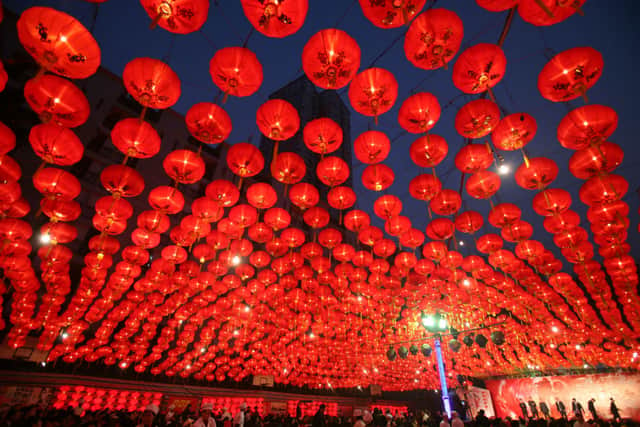Lantern Festival 2022: Chinese celebration explained, traditional food, origins - and when is it this year?
This article contains affiliate links. We may earn a small commission on items purchased through this article, but that does not affect our editorial judgement.
and live on Freeview channel 276
The Lantern Festival marks the end of the Chinese New Year holiday, and is being celebrated today (15 February).
Chinese New Year celebrations can last for up to 16 days, with seven days of those being a public holiday.
Advertisement
Hide AdAdvertisement
Hide AdThe festivities reach a climax with the Lantern Festival, which falls on the 15th day of the first Chinese lunar month: in 2022, it is celebrated on 15 February.
But what are the Lantern Festival’s origins - and how is it usually celebrated?
Here is everything you need to know about it.
What is the Lantern Festival?
Over the years, the festival has developed multiple meanings. It celebrates family reunions, socialising and freedom, while also featuring ancient spiritual traditions.
Usually, families reunite on New Year’s Eve and visit in-laws on the 2nd day of the New Year. Shops and businesses reopen on the 5th, and after that the celebrations gradually die down.
Advertisement
Hide AdAdvertisement
Hide AdBut on the 15th day of the new year - the Lantern Festival - everyone takes to the streets to celebrate and light lanterns.
Some regard the festival as the “true” Chinese Valentine’s Day, rather than the more traditional day of Qixi.
That’s because in Ancient China, when women often weren’t allowed out of the house, on the Lantern Festival they were able to celebrate freely, joining in traditions and interacting romantically with men.
Despite its importance, the Lantern Festival isn’t a national holiday, so there are no days off for celebrations.


What are the origins of the festival?
Advertisement
Hide AdAdvertisement
Hide AdIt is thought that the Lantern Festival started more than 2000 years ago during the Han Dynasty.
At that time, Buddhism was popular within China.
Emperor Ming, hearing that monks would light candles for the Buddha on the 15th day of the first lunar month, ordered the imperial palace and temples to light candles and the citizens to hang lanterns.
Lighting lanterns continued as a tradition for Chinese people throughout the dynasties which followed.
The celebrations eventually developed into the Lantern Festival recognised today.
What is the lantern lighting tradition?
Advertisement
Hide AdAdvertisement
Hide AdLanterns have become the symbol of the festival, and in modern times, red lanterns can be seen hanging in the street.
They can also be found within houses and in stores, and often depict traditional Chinese folklore and riddles.
Throughout history, countless variations of lanterns have been created, from small, palm-sized globes to huge parade floats.
A famous variation is the Kongming lantern, which represents hope, success and happiness.
Advertisement
Hide AdAdvertisement
Hide AdTraditionally, lanterns would be gifted to newlyweds or couples without children to pass on blessings.
Pregnant women would also receive a pair of small lanterns to wish health and safety for both mother and child.
In some regions, lanterns are burned to determine the gender of a future child from the shape of the ashes.
Are there other traditions?
There are myriad traditions and activities that take place during the Lantern Festival, from lighting lanterns to moon gazing and lion dances to eating rice balls.
Each place has its own traditions.
Advertisement
Hide AdAdvertisement
Hide AdIn the city of Fengyang, swings play a major role, while one of the sights in Hebei province is the jǐng xíng lā huā performances, where people hold fans and parasols and dance to the beat of drums.
The trademark food of the celebration is called yuan xiao - the same traditional Chinese name of the festival itself.
It is one of many Chinese New Year desserts in the form of rice dumplings, with sweet fillings made of syrup, red bean paste and black sesame paste.
They can be steamed or fried but are traditionally boiled and served in hot water during the festival.
A message from the editor:
Advertisement
Hide AdAdvertisement
Hide AdThank you for reading. NationalWorld is a new national news brand, produced by a team of journalists, editors, video producers and designers who live and work across the UK. Find out more about who’s who in the team, and our editorial values. We want to start a community among our readers, so please follow us on Facebook, Twitter and Instagram, and keep the conversation going. You can also sign up to our newsletters and get a curated selection of our best reads to your inbox every day.
Comment Guidelines
National World encourages reader discussion on our stories. User feedback, insights and back-and-forth exchanges add a rich layer of context to reporting. Please review our Community Guidelines before commenting.
